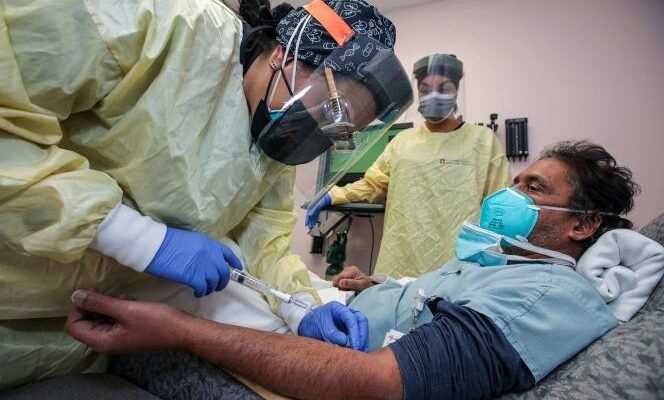More than a year after the start of the Covid-19 pandemic, vaccination represents the main means of fighting the virus. While treatment for severe forms has progressed, antiviral treatments to prevent the disease or treat infected people, before the inflammatory phase, have so far not really been proven. However, the path of monoclonal antibodies seems interesting. Their principle is to mimic the immune response to prevent the virus from entering cells. These treatments thus target the Spike protein, which is used by the virus to bind to the input receptor.
The National Medicines Safety Agency (ANSM) announced, Tuesday, June 8, that access to monoclonal antibodies would be extended, from June 11, to patients at risk of complications related to co-morbidities, regardless of age, to those with uncontrolled HIV infection or to the AIDS stage, and to children from 12 years of age at high risk for a severe form of Covid-19, especially due to severe immunosuppression. Until then, these treatments were reserved for adult patients with an immunity deficit, patients over 80 years of age and those over 70 years of age with certain comorbidities (obesity, respiratory or heart failure, diabetes, etc.).
Two dual therapies are concerned: the casirivimab and imdevimab cocktail, from the Swiss laboratory Roche and the American biotech Regeneron – which was publicized in the fall of 2020 when it was administered to the President of the United States Donald Trump -, and the cocktail bamlanivimab and etesevimab, from Lilly France. They received a temporary cohort use authorization (ATU) from the ANSM in mid-March.
“As early as possible”
“We are responding to a strong demand from medical teams to treat children who have a congenital immune deficiency, or linked to their treatment (chemotherapy, bone marrow transplant, etc.), and to meet a medical need for others. people who were not eligible until now ”, details Alban Dhanani, deputy director of the medical department in charge of anti-infectious drugs and vaccines at the ANSM.
Once the infection is confirmed by a positive PCR test, “The challenge is to start these treatments as early as possible, in the first five days after the onset of symptoms, because they seem all the more effective when the body has not yet produced its own antibodies”, explains Professor Guillaume Martin-Blondel, infectious disease specialist at Toulouse University Hospital. The objective is to avoid the development towards a serious form of the disease which could lead to hospitalization, or even to a passage in intensive care. General practitioners have a role in identifying patients. “It is at an early stage of infection, when the viral load is highest, that monoclonal antibodies work best, if the infection with Covid-19 enters an inflammatory phase, it is too late, the disease being too advanced to hope for an effective action from these treatments ”, specifies Alban Dhanani.
You have 58.74% of this article to read. The rest is for subscribers only.
